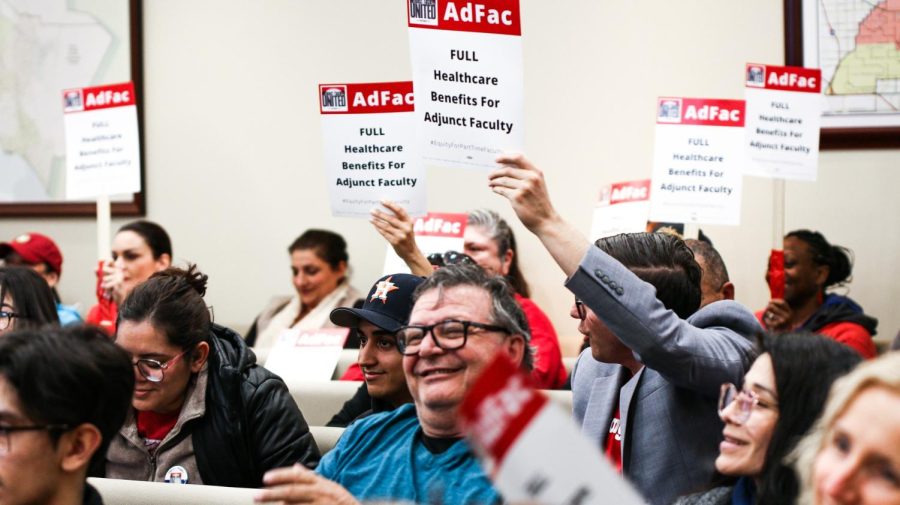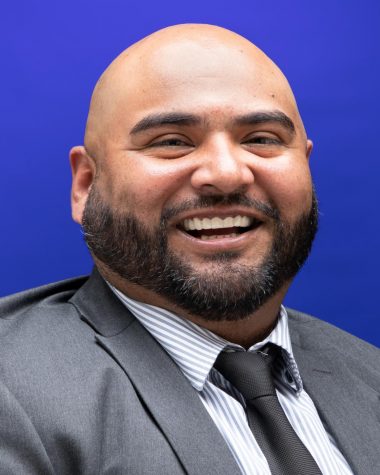Adjunct faculty denied full healthcare benefits in first round of negotiations with NOCCCD
Dashiel Johnson, Executive Director for Adjunct Faculty United AFT 6101 leads part-time workers during a protest at the NOCCCD on Tuesday, March 14, 2023. Photo credit: Aaliyah Skipper
April 3, 2023
After a well-attended protest at the March 14 Board of Trustees meeting where part-time faculty at NOCCCD demanded full health care benefits, Adjunct Faculty United Local 6106 hit a roadblock when the district denied their proposal on March 16.
The union submitted their proposed contract for full benefits on Feb. 2, but the district responded with a counteroffer of partial coverage.
“At this time, the district has already offered to increase part-time health benefits reimbursement for eligible members from the current $2,000 to $8,058 effective Spring 2023 if ratified by AdFac prior to the end of the current semester,” said Chancellor Byron Breland in a statement released to the Hornet Newspaper from North Orange County Community College District offices.
But union reps say that isn’t enough.
“I work hard for this district,” said adjunct instructor Naveen Kanal. “The one thing I don’t want to think about is my health. You walk out that door and you are not covered. Talk about basic needs and insecurity.”
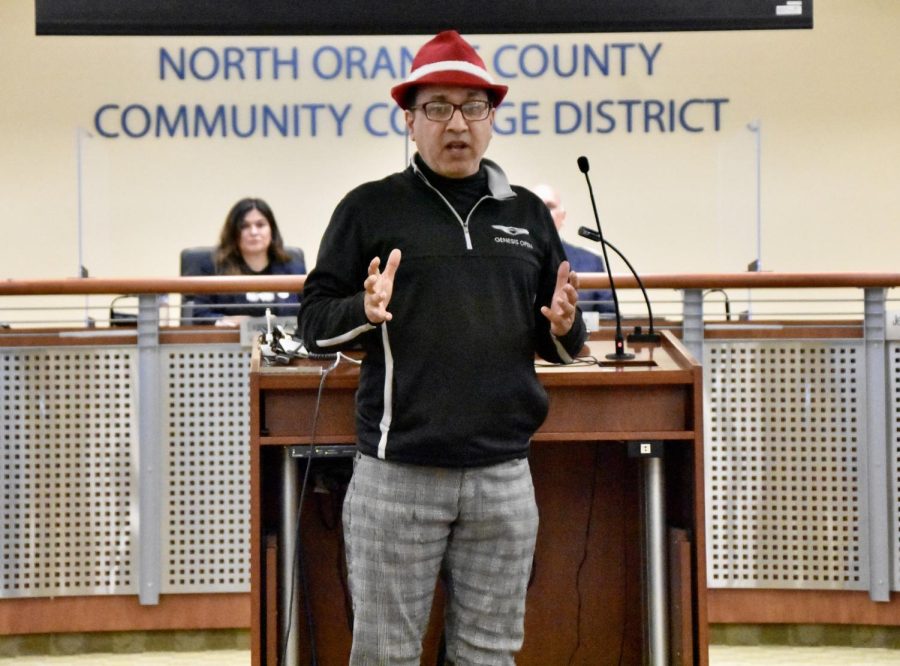
According to Cal Matters, the California Federation of Teachers conducted a survey that shows 6% of part-time faculty don’t have health insurance.
In the same survey it says that about a quarter of them relied on their spouse’s coverage while 17% got theirs from Covered California or Medi-Cal.
CFT argues that employers should be providing health insurance, not spouses or public subsidies.
“We have many members who have been teaching for 20 years or more without ever getting healthcare from this employer,” said Jeff Freitas, president of CFT, AdFac’s parent union. It comprises of 147 local unions who represent more than 120,000 education workers from elementary school to the university level. “Every single part-time faculty has a master’s or doctor’s degree. Shouldn’t they be getting benefits as part of their job?”

AdFac United’s proposed contract would include any part-time faculty member whose total teaching assignments equals or exceeds 40% of the equivalent of a minimum full-time teaching assignment. The equivalent of a minimum full-time teaching assignment or a 40% load is six units which translates to about two classes.
“We began a statewide campaign with our state union affiliate, the California Federation of Teachers, to win funding and pass legislation to fully fund adjunct healthcare,” said Executive Director of Adjunct Faculty United, Dashiel Johnson. “We successfully passed a budget of $200 million of ongoing funding, earmarked for healthcare.”
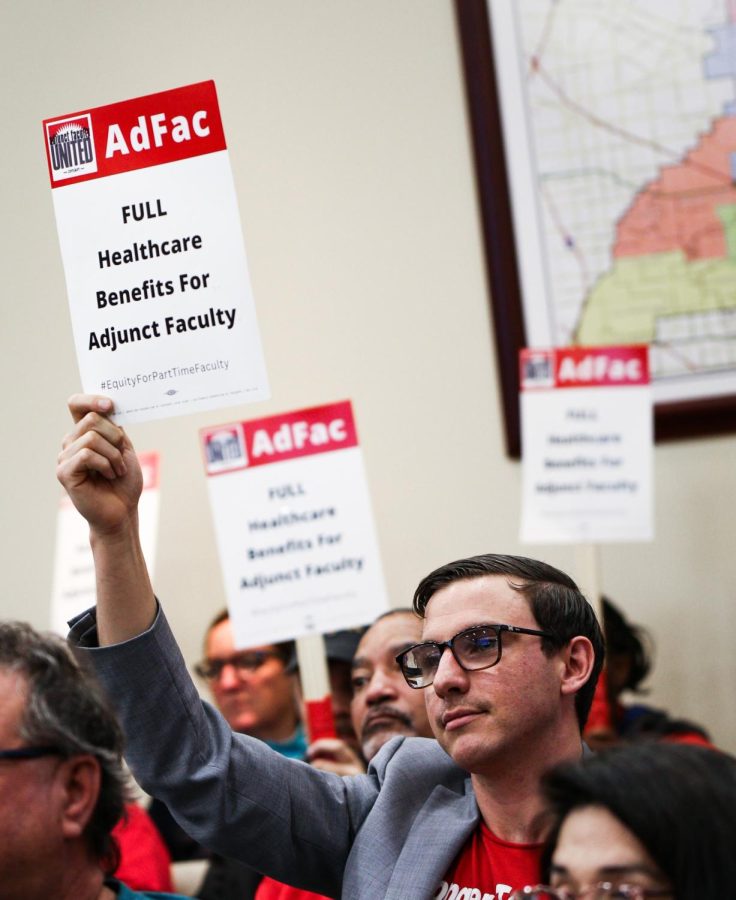
Gov. Gavin Newsom signed AB 190 into law on September 27, 2022, which is a higher education spending bill that includes an expansion of healthcare reimbursement options for part-time faculty at community colleges. It includes “changes to further incentivize districts to provide quality, affordable and accessible coverage to all eligible part-time faculty,” according to the California Teachers Federation website.
This bill directs $200 million of funds from Proposition 98, which is the law that provides funding for public schools from state tax dollars, to support districts in funding health insurance for part-time faculty.
“We are just asking the NOCCCD to take advantage of those funds and provide our members who work a 40% load access to the same healthcare plans that full-time faculty members have access to,” said Johnson.
Under the new law, districts can access those funds if they offer the same health benefits currently offered to full-time faculty to all part-time faculty working at least 40%. Up until 2021, NOCCCD did not offer dependent coverage for full-time faculty, but after years of negotiations with United Faculty, the union for full-time faculty, they signed a new contract providing full health care coverage to full-time employees working at least 50% as well as their dependents, as of January 2023.
For the 2022-23 academic year, there are 1,223 adjunct faculty districtwide at NOCCCD and they teach 47% of the instructional hours, according to NOCCCD. Breland said “$200 million set aside would not be enough money to pay for family health care benefits for all adjunct faculty at all 73 community college districts.”
Breland and the district’s concern is not being fully reimbursed by the state due to lack of funds if they were to agree to AdFac’s proposal. “The district would be required to cover an estimated $8 million per year that had not been budgeted,” Breland said.
The Hornet reached out to Irma Ramos, chief negotiator for NOCCCD, but has not received a response.
On March 14, members of AdFac United, along with students and full-time professors, peacefully protested outside the district building in Anaheim, stating their case for healthcare.
“We are here fighting for healthcare for all part-time faculty, librarians, and counselors who teach in the NOCCCD,” said union president Seija Rohkea during the protest. “It’s important to know we have students here, full-time faculty here, we have leaders from different unions from California here. This is an important campaign that we need to win.”
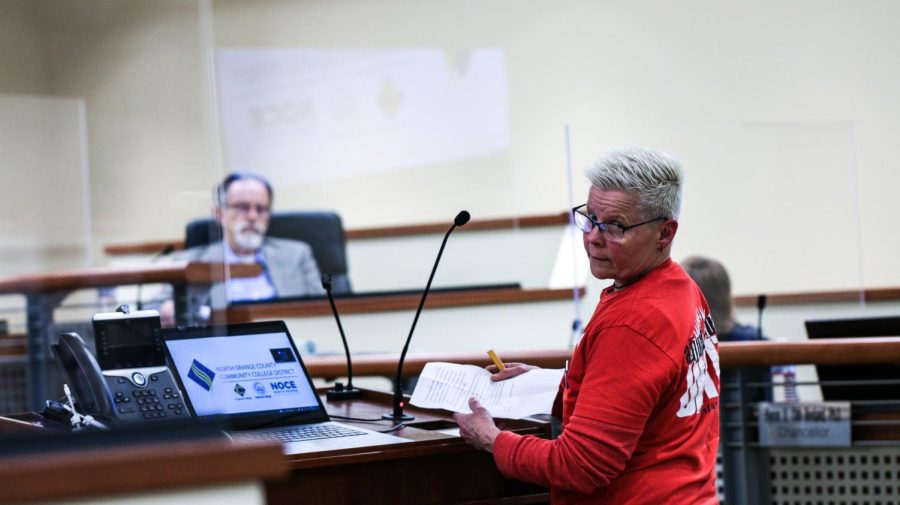
AB 190 expands on existing law, which allows the state to reimburse up to 100% of a part-time faculty member’s health insurance premiums.
In the current contract between NOCCCD and AdFac United, the district will reimburse up to $2,200 per year in insurance premiums to employees actively employed by the district for three preceding regular semesters, excluding summer, with a load of at least 33%.
In the district’s counteroffer to the union, they’ve raised the $2,200 to $8,058 for faculty members who have been teaching for at least three semesters at 40% load.
According to the statewide Part-Time Faculty Health Insurance Program, if the faculty member falls below part-time 40% threshold faculty status for one term, the district may continue to provide the faculty member health insurance. However, the premium paid during that term would not be reimbursable under current law.
The Hornet reached out to the district’s benefits office to get information on the annual health insurance premium rate for faculty but did not get a call back.
Fullerton College philosophy instructor David Donley thinks adjunct faculty are the most valuable and vulnerable campus community members, and he supports the union’s fight for healthcare benefits.
“Some of us, including myself, receive healthcare benefits from CSFU, which provides healthcare benefits to all adjunct faculty teaching at least two courses per semester,” he says, referring to the California Faculty Association, the union that represents 29,000 part-time faculty in 23 CSU campuses. Under the CFA contract, 100% coverage of health, dental, and vision premiums to part-time instructors teaching at least six units for two or more consecutive quarters.
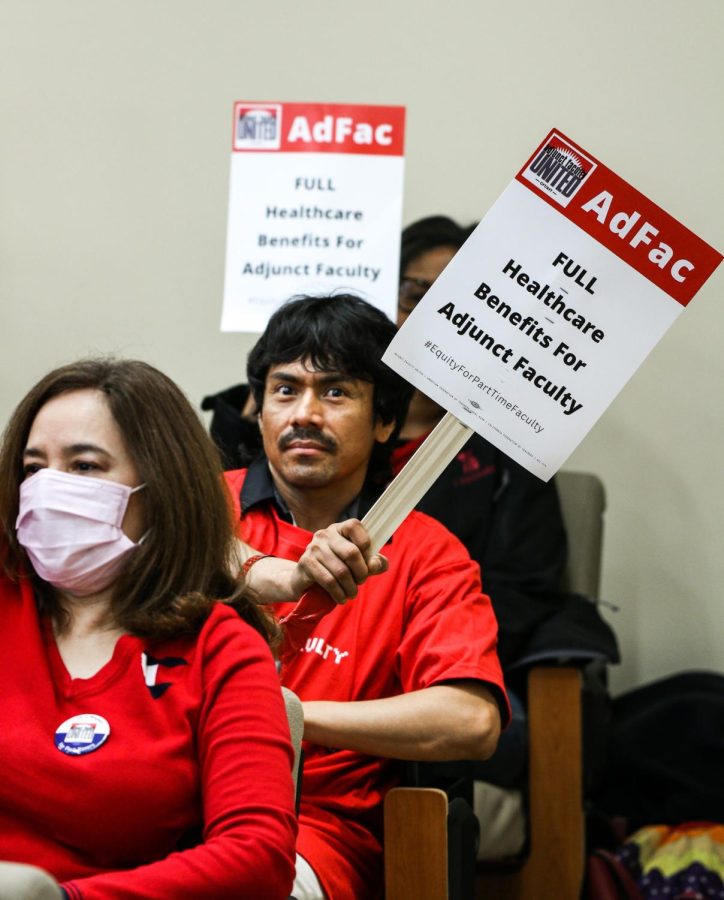
The demand for healthcare is part of ongoing negotiations between AdFac United and the district. Adjuncts had been advocating for years to receive paid office hours and won that right in spring 2023.
“Quite often, at the end of class, I have students coming up to me asking a question. And I’m thinking this is going to require a deeper dive than just a five minute conversation,” said Marlo Smith, who teaches English as Second Language at North Orange Continuing Education, to The Hornet in December 2022.
March 14, 2023, marked the beginning of paid office hours, but faculty had to apply by February 15 to receive the pay. Under the new memorandum of understanding, adjunct faculty will be paid for up to one hour a week at the rate of $40, on top of their regular teaching pay.
According to Johnson, AdFac is determined to work with the district to secure full healthcare insurance for adjunct faculty. “Our negotiations are ongoing. We will continue organizing our members and the communities we are part of to urge the district to do the right thing,” he said.
AdFac United is scheduled to rally again on April 11 at 5 p.m. at the district building during the Board of Trustees meeting. “We are leafleting each campus with flyers that stress our demands,” said Johnson. “We’re recruiting more union members. We submitted a petition signed by 443 people. We’re building a coalition of students, union leaders and elected officials who support our demands to create healthcare for adjunct faculty.”
*Julianne Le is a contributing writer on this article.

